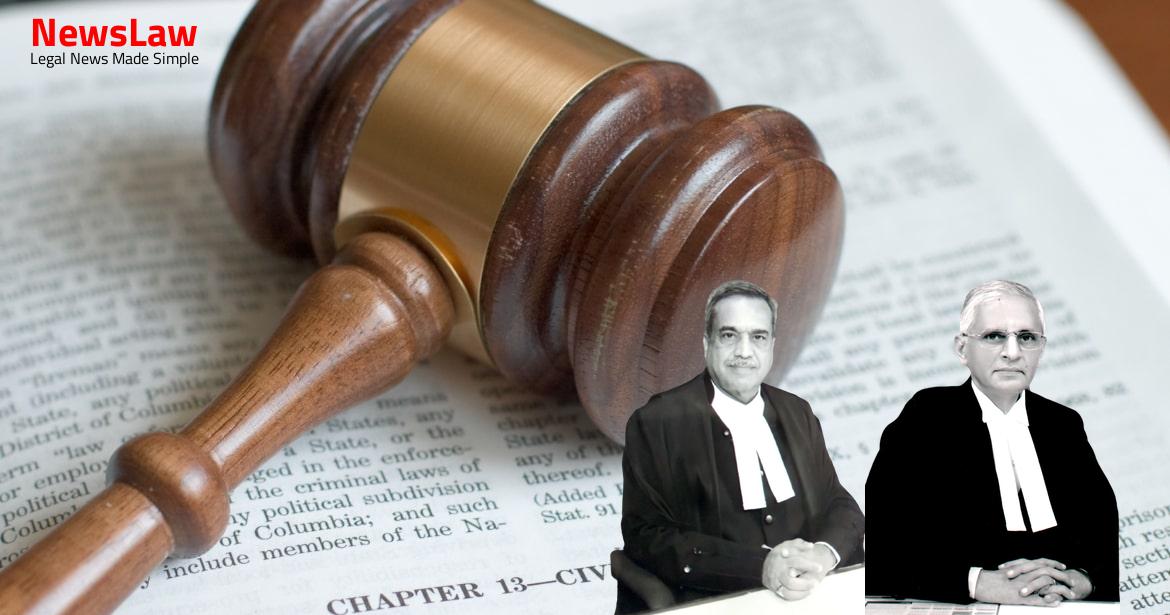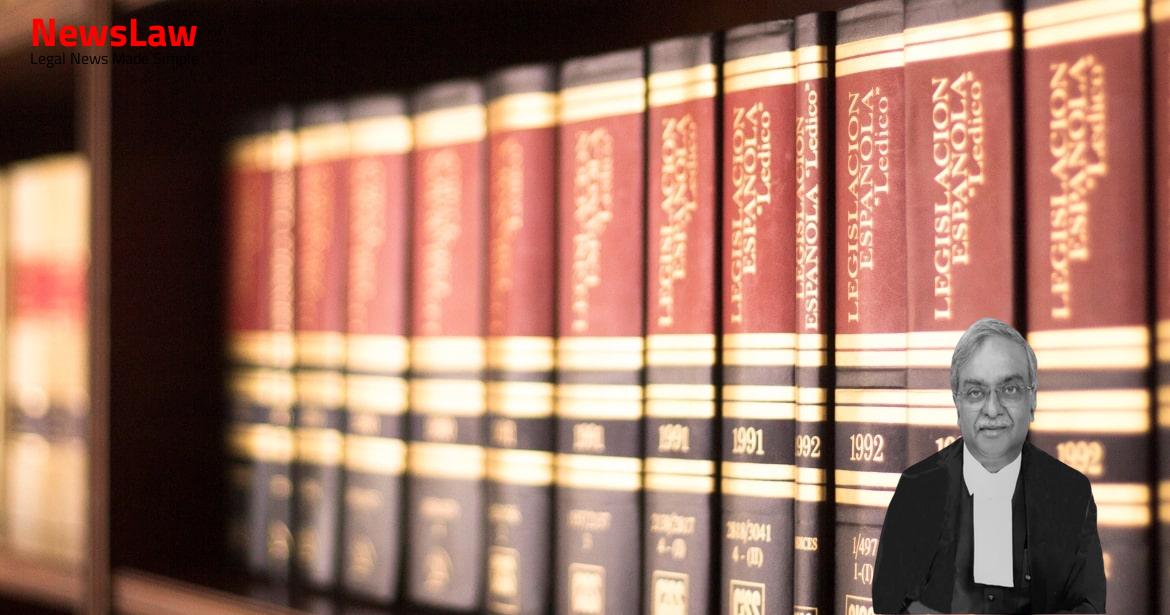Dive into the intricate legal analysis conducted by the court in a recent criminal case conviction. The case delves into the interpretation of evidence, witness statements, and the application of relevant laws. Stay tuned to grasp the nuances of the court’s decision-making process.
Facts
- The appellant challenged the judgment before the High Court in Criminal Appeal No.1102/2017.
- A charge sheet was filed under Sections 363, 366, 376 and 506 of the Indian Penal Code along with sections 3 and 4 of the Protection of Children from Sexual Offences Act.
- An FIR was registered in Crime No.625/2013 under Sections 363 and 366 IPC.
- The father and mother of the prosecutrix were examined as PW-1 and PW-2 respectively, while the prosecutrix herself was examined as PW-3.
- One of the accused, Raksharam, was acquitted.
- The appellant is appealing the judgment of the High Court dated 14.03.2018 in Criminal Appeal No.1102/2017.
- The prosecutrix was brought back and subjected to a medical examination.
- Constable Pramod Kumar Shah, who carried the FIR, was examined as PW-5 and the charges against him were not proved.
- The prosecutrix was found by the police along with Ramasre alias Siri.
- Trial was conducted after the accused denied the charge.
- Dr. Rabia Sultan, who conducted the medical examination on the prosecutrix, was examined as PW-4.
- The appellant was convicted and sentenced by the Additional Sessions Court and Special Judge POCSO Act, Bahraich in a case where he was accused no.4.
- The father of the prosecutrix filed a report alleging that the appellant and others had cooperated in enticing and taking away his 14-year-old daughter.
- Charges were framed against the accused after investigation by Sub-Inspector Tara Prasad Pandey.
- The trial court found the accused guilty based on the evidence presented and their denial during statement under Section 313 of Cr.PC.
- The accused were sentenced to various terms of rigorous imprisonment and fines under multiple sections of the IPC and POCSO Act.
- The default sentence for non-payment of fine was also imposed and all sentences ordered to run concurrently.
- The learned Judge in the High Court confirmed the conviction based on evidence of the appellant raping the prosecutrix multiple times after enticing her.
Also Read: Supreme Court Upholds Rejection of Plaint Under Order VII Rule 11 of CPC: A Critical Analysis
Arguments
- Appellant’s contention that the trial court and High Court erred in convicting and upholding conviction based on unreliable evidence.
- Reference to contradictions in the complaint initiation and statements made by the prosecutrix.
- Argument that evidence of parents (PW-1 and PW-2) and prosecutrix (PW-3) was not reliable.
- Challenging the medical examination report as insufficient to establish the charges.
- Disputing the theory of kidnapping, enticing, or rape of the prosecutrix.
- Appellant’s disagreement with the judgment of the High Court, leading to the appeal.
- Inconsistencies in the statements regarding the alleged enticement of the minor daughter by Ramasre alias Siri.
- The charge under Section 376-D IPC is not sustainable and does not qualify as gang rape.
- The father and doctor both indicated the prosecutrix’s age to be around 16 years, making consensual sex improbable.
- Arguments presented for setting aside the judgment due to lack of justification for the Section 376-D IPC conviction.
- Trial court and High Court considerations analyzed in relation to the incident and evidence presented by witnesses.
- Prosecutrix’s complaint of physical relations with the appellant and subsequent pregnancy suggested consensual nature.
- Discrepancies in statements not deemed contradictions, with witnesses supporting the prosecution’s case.
- Medical examination confirming the prosecutrix’s pregnancy further supporting the established charge.
Also Read: Validity of Debt and Enforcement of Section 138 NI Act
Analysis
- The charge under Section 506 of IPC against the appellant is not supported by sufficient evidence.
- The conviction and sentence under Section 506 imposed by the trial court and affirmed by the High Court are not sustainable and liable to be set aside.
- The charge under Section 376 IPC was established based on the prosecutrix’s testimony.
- The incident occurred prior to the amendment, so the pre-amended provision of Section 376 IPC applies.
- The evidence presented by the prosecutrix regarding the physical relationship with the appellant leading to her pregnancy was deemed credible.
- Medical evidence supported the prosecutrix’s claim of being 24 weeks pregnant.
- The High Court’s conclusion indicated that the allegation of rape was against the appellant alone.
- Other accused were not involved in the rape as per the prosecution’s case.
- The charge upheld under Section 363, 366, and Section 4 of the POCSO Act.
- The charge of gang rape was not established with convincing evidence against all accused.
- Persons convicted of rape to be punished with rigorous imprisonment for a minimum of seven years
- Punishment may extend to imprisonment for life
- Convicted individuals also liable to pay a fine
- No criminal antecedents of the appellant were found in the available records.
- The appellant is a father of five children, with the eldest being over 18 years old.
- There is no indication to suggest that the appellant would engage in similar behavior in the future.
- The 7-year sentence is considered sufficient as a deterrent for the ends of justice.
- The appellant has been in custody since 20.09.2013 according to the custody certificate dated 05.12.2017.
Also Read: Enlargement on Bail in Illegal Mining Case
Decision
- The appellant is convicted under Section 376 IPC and sentenced for the period undergone.
- The conviction under Section 506 IPC is set aside.
- The appellant has served the sentence except for payment of fine.
- The fine and default sentence imposed by the trial court is maintained.
- The appellant has been in custody for more than 8 years, which is considered as his period of sentence.
- The appellant is ordered to be released on payment of fine as all sentences have run concurrently, unless he is required to be detained in any other case.
- The appeal is allowed in part.
- Pending applications, if any, shall stand disposed of.
- The fine and default sentence imposed by the trial court shall remain unaltered.
Case Title: MANOJ MISHRA @ CHHOTKAU Vs. THE STATE OF UTTAR PRADESH (2021 INSC 640)
Case Number: Crl.A. No.-001167-001167 / 2021



